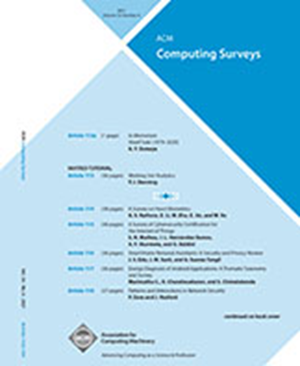对抗性模式:构建健壮的Android恶意软件分类器
IF 23.8
1区 计算机科学
Q1 COMPUTER SCIENCE, THEORY & METHODS
引用次数: 0
摘要
机器学习模型越来越多地应用于医学、商业、自动驾驶汽车和网络安全等各个领域,以分析大量数据、检测模式并做出预测或建议。在网络安全领域,这些模型在恶意软件检测方面取得了重大进展。然而,尽管它们能够从非结构化数据中理解复杂的模式,但这些模型很容易受到对抗性攻击的影响,这些攻击会对恶意软件样本进行轻微的修改,从而导致从恶性到良性的错误分类。已经提出了许多防御方法来检测这种对抗性攻击或提高模型的鲁棒性。这些方法导致了大量的攻击和防御技术,并出现了一个被称为“对抗性机器学习”的领域。在这份调查报告中,我们对Android恶意软件分类器背景下的对抗性机器学习进行了全面的回顾。Android是全球使用最广泛的操作系统,很容易成为恶意代理的目标。本文首先介绍了Android恶意软件分类器的广泛背景,然后检查了对抗性攻击和防御的最新进展。最后,给出了鲁棒性恶意软件分类器的设计指南,并对未来的研究方向进行了概述。本文章由计算机程序翻译,如有差异,请以英文原文为准。
Adversarial Patterns: Building Robust Android Malware Classifiers
Machine learning models are increasingly being adopted across various fields, such as medicine, business, autonomous vehicles, and cybersecurity, to analyze vast amounts of data, detect patterns, and make predictions or recommendations. In the field of cybersecurity, these models have made significant improvements in malware detection. However, despite their ability to understand complex patterns from unstructured data, these models are susceptible to adversarial attacks that perform slight modifications in malware samples, leading to misclassification from malignant to benign. Numerous defense approaches have been proposed to either detect such adversarial attacks or improve model robustness. These approaches have resulted in a multitude of attack and defense techniques and the emergence of a field known as ‘adversarial machine learning.’ In this survey paper, we provide a comprehensive review of adversarial machine learning in the context of Android malware classifiers. Android is the most widely used operating system globally and is an easy target for malicious agents. The paper first presents an extensive background on Android malware classifiers, followed by an examination of the latest advancements in adversarial attacks and defenses. Finally, the paper provides guidelines for designing robust malware classifiers and outlines research directions for the future.
求助全文
通过发布文献求助,成功后即可免费获取论文全文。
去求助
来源期刊

ACM Computing Surveys
工程技术-计算机:理论方法
CiteScore
33.20
自引率
0.60%
发文量
372
审稿时长
12 months
期刊介绍:
ACM Computing Surveys is an academic journal that focuses on publishing surveys and tutorials on various areas of computing research and practice. The journal aims to provide comprehensive and easily understandable articles that guide readers through the literature and help them understand topics outside their specialties. In terms of impact, CSUR has a high reputation with a 2022 Impact Factor of 16.6. It is ranked 3rd out of 111 journals in the field of Computer Science Theory & Methods.
ACM Computing Surveys is indexed and abstracted in various services, including AI2 Semantic Scholar, Baidu, Clarivate/ISI: JCR, CNKI, DeepDyve, DTU, EBSCO: EDS/HOST, and IET Inspec, among others.
 求助内容:
求助内容: 应助结果提醒方式:
应助结果提醒方式:


